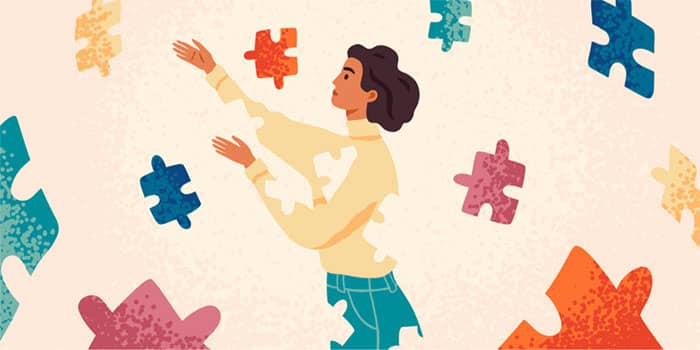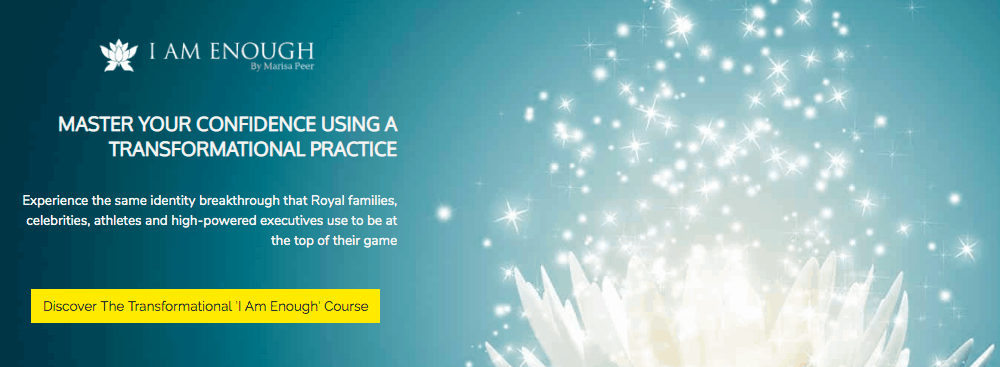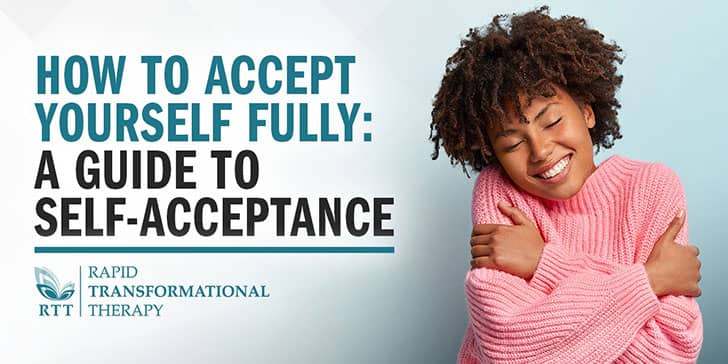Many of us have trouble accepting ourselves fully.
We find it easy to appreciate our strengths, but when it comes to our flaws and failures, we develop an overwhelming sense of judgment and rejection.
If you have ever been unreasonably hard on yourself, or find it challenging to get over your failures or weaknesses, then you may be lacking in self-acceptance.
Self-acceptance, also sometimes referred to as self-approval, is a crucial component for your psychological well-being; without it, it is easy to be overly self-critical, obsessing over your failures and shortcomings.
These negative emotions hold you back from self-actualization (which is becoming everything you are capable of becoming) and achieving the life you want.
There are various methods and tools to develop self-acceptance; in this article, we discuss what self-acceptance and self-approval is, and share several proven strategies on how to develop it.
You will learn:
- What self-acceptance is
- What is the difference between self-acceptance and self-esteem
- How does self-acceptance affect your life and why is it important
- How can you tell if you have low self-acceptance
- Ways to develop better self-acceptance
What Is Self-Acceptance?

As its name suggests, the definition of self-acceptance is the complete acceptance of oneself, of both your positive and negative traits.
It is much easier to appreciate our positive traits, but for true self-acceptance, you must also be able to embrace the negative, less-desirable parts of yourself.
A popular misconception of self-acceptance is that it means giving up on yourself. That you simply give yourself a pass for your faults and weaknesses and stop trying to change them.
Of course, this is simply untrue.
Instead, true self-acceptance means being aware of both your positive and negative traits without attaching negative emotions or judgment on who you are.
It means being able to be objective about your strengths and weaknesses and not compromise on your self-worth.
To put it simply, the self-acceptance definition is understanding that your value is separate from your actions and qualities. Despite having made mistakes and flaws, these things do not define you.
Understandably, this can be difficult; but acknowledging your failures and weaknesses is the only way you can begin to work on them and create real progress.
Self-acceptance vs self-esteem
You might be wondering, what is the difference between self-acceptance and self-esteem?
It is easy to confuse self-acceptance and self-esteem since these two concepts are related. However, while they are both critical to your psychological well-being, they are not the same thing.
Self-esteem is how valuable you perceive yourself relative to other people. These are the strengths you offer to the world, and how favorably you think you compare to others.
Self-esteem generally relies on external ‘markers’ like your accolades or accomplishments. Being promoted at work can be a massive boost to your self-esteem, while being placed under a performance review can erode it.
When clinical psychologists talk about healthy self-esteem, they mean that you have a reasonable, positive self-image. You are aware of your strengths relative to other people and believe in your value.
Unhealthy self-esteem is when the needle falls on either end of the spectrum—in other words, if you think too much of yourself or believe that you are worthless and have nothing to offer, you have unhealthy self-esteem.
In contrast, self-acceptance is much deeper than self-esteem. Unconditional acceptance does not depend on your external circumstances, nor your success and achievements. It is being able to accept both the good and bad about yourself.
Unlike self-esteem, self-acceptance is not conditional. Even if you lost your job, had just broken up with your spouse, or lost all your money, you would still be able to love and show compassion to yourself.
Naturally, it would be much easier for a person with healthy self-acceptance to develop healthy self-esteem. Since you rely less on external validation, you can appreciate your value regardless of what goes on in your life.
What is the Importance of Self-Acceptance? How Does it Affect Your Life?

Unconditional self-acceptance is essential for your mental and emotional health, and it is one of the factors in the six-factor model of Psychological Well-being.
Having high self-acceptance leads to better mood regulation, fewer depressive symptoms, and increased positive emotions.
Without self-acceptance, your psychological well-being suffers, which hampers efforts to create a happier, more successful life for yourself.
For example, those with a poor body image may reject their bodies due to low self-acceptance. They compare themselves to others and feel unattractive, believing that their body is a failure.
This perception causes them to feel ashamed, self-conscious, uncomfortable, and anxious about their body. As a result, they obsess about their body shape, weight, food, and calories, which eventually could even lead to an eating disorder.
People with high self-acceptance understand that their figure does not define them.
They can love both their internal and physical self, and recognize that crash diets and starvation are simply alternate forms of self-abuse.
With high self-acceptance comes self-compassion. Being able to love and respect themselves allows them to make healthy, constructive changes to achieve their ideal body weight.
Once you achieve self-acceptance, you also experience other psychological benefits such as:
- Increased freedom to be yourself
- The ability to take risks without worrying about the outcome
- Less fear of failure
- Living more authentically by living for yourself (and not for others)
- Increased self-worth
- More compassion and less self-criticism when you fail
- More independence and autonomy over your own life
- Less despite to win the approval of others
- Increased self-esteem
How Can I Tell If I Have Low Self-Acceptance?

Many suffer from low self-acceptance, and for good reason—research shows that before the age of eight, our self-acceptance is entirely dependent on our caretakers.
If your parents verbally or nonverbally communicated that you were not attractive enough, not smart enough, not good enough, etc., while you were growing up, you may think of yourself as only conditionally acceptable. This would have likely had a negative impact on your self-acceptance.
Today, you may have low self-acceptance if you have any of these symptoms:
- You often have a negative attitude
- It is difficult to acknowledge your weaknesses or failures
- You are constantly critical of yourself, and/or are confused about your identity
- You wished you were different than who you already are
We all suffer from these symptoms at one time or another, but if you find yourself constantly showing these behavioral patterns then it would be a good idea to develop better self-acceptance.
How Do You Achieve Self-Acceptance?

Now you may find yourself asking “what is the key to self-acceptance? How do I achieve it myself?” Developing unconditional self-acceptance can be challenging, especially since it requires undoing years of subconscious conditioning.
However, by following the strategies and steps below, you can develop better self-acceptance with time and practice.
Step 1. Forgive yourself
The first step in developing self-acceptance is showing compassion to yourself.
Understand that you did the best you could at that time, acknowledge that you can no longer change your past failures and mistakes, and then move on.
Self-Acceptance Exercise: Think of your past self as a different person, and that you can only change what you can control right now, which is your present self.
When you reframe your mind this way, it generates self-compassion. You begin to understand that what you dislike about yourself today is because you judge your past self based on your current self, who needed to make that mistake in the first place.
Marisa Peer, bestselling author and founder of Rapid Transformational Therapy®, (RTT®), believes that many of us are our own worst critic, and this negative attitude prevents us from developing self-compassion.
However, by changing the way you speak to yourself, you can begin to forgive yourself and develop a healthier relationship with you.
Having this mindset is the crucial first step towards developing self-acceptance. Take ownership of your past mistakes and failures, but do not beat yourself up about it. Forgive yourself—after all, you did the best you could at the time.
Step 2. Practice mindfulness
Much of our negative self-talk happens in our subconscious—which means that we are not even aware of when we reject ourselves.
Take some time to listen to your thoughts and feelings—do you get anxious when you think about a particular area of your life? Which parts of yourself are you ashamed of? Which parts do you try to avoid thinking about?
These are difficult questions, but answering them will open your eyes to which parts of yourself that you find most difficult to accept.
Self-Acceptance Exercise: It may be helpful to write these down in a journal and keep track of how you feel throughout the day—you may realize your dysfunctional behaviors and thought patterns that stop you from accepting yourself.
While doing this exercise, do not forget to practice self-compassion. Remember, the goal of this exercise is not to judge yourself, but rather it is simply to create an awareness of the parts of yourself which you have been subconsciously rejecting.
Step 3. Welcome your feelings—both good and bad

Exploring parts of yourself that you find difficult to accept will understandably bring up a lot of negative feelings.
Whenever you experienced these feelings in the past, your subconscious’s first instinct was to push them away. Similar to how our nervous system actively avoids physical pain, your mind works the same way by avoiding mental and emotional pain.
The problem is that your subconscious is merely avoiding the issue, which is a short term solution. To accept yourself, you must confront these feelings head-on.
Your first instinct might be to try to escape these unpleasant emotions but do not push them away this time.
Self-Acceptance Exercise: Explore that feeling with a sense of curiosity and cool detachment. Pretend that you are your own best friend—if they showed up hurt, how would you treat them?
Allow yourself to feel these negative emotions for a while and then ask yourself—what can you learn from this? How can you turn this emotion into something positive?
You may also possibly experience positive feelings during this exercise, and you may instinctively reject them—try not to. Accept these positive emotions, appreciate yourself, and understand that you earned the good things along with the bad things in your life.
Step 4. Forget being perfect
Thinking that you must be perfect is one of the biggest impediments to unconditional self-acceptance.
As human beings, we inevitably make mistakes and develop flaws. Those who have low self-acceptance may try to deny these flaws or avoid situations where they may fail.
They then end up living an inauthentic life because the fear of failure keeps them from living out their potential.
Understanding that your imperfection makes you unique and that failure is a part of life will help you be more accepting of yourself.
To help you with this exercise, do not define yourself by either your success or failure. Instead, understand that your value is intrinsic to your being—in other words, recognize that you are the most important person to yourself, regardless of the mistakes and failures you have made.
When you let go of the need to be perfect, it becomes much easier to be authentic and accepting of yourself, of both your good and bad.
Step 5. Stop comparing yourself
One reason why developing self-acceptance is so challenging is because we constantly compare ourselves to others. Especially with the advent of social media, there is a sudden rush for people to appear perfect on their social feed.
This creates the illusion that everyone you know or follow has a happy, perfect life, making it impossible for you to appreciate your own.
Studies have shown that people on social media are more likely to compare themselves to other people and objectify themselves. On average, those who had a social media profile suffered from lower self-esteem, greater body shame, and worse mental health.
Remember that true self-acceptance is unconditional—it does not depend on your perceived success compared to your peers. Your life is uniquely your own, and because of that, it will always be valuable to you.
When you stop comparing yourself to others, you begin to journey inward and focus on you. External validation matters less, so you start seeking validation from yourself, which is a part of self-acceptance.
Step 6. Take an active role in self-improvement
When you are learning to accept yourself, it can be a difficult process. It is not one that can be rushed, nor is it something that will happen overnight. It is something that will need plenty of time, attention, and perseverance.
We know this could be a hard thing to achieve if you are investing in your self-acceptance without any external support. That is why Marisa Peer created her 21-Day Unstoppable Confidence Challenge.
Confidence is inherently tied to self-acceptance. You need the confidence to accept yourself as you are, the confidence to move through the world as your authentic self, and the confidence to remain as you are once you have achieved the behaviour and positive mental state. If you join the 21-Day Unstoppable Confidence Challenge, you will see drastic change in your confidence, and therefore self-acceptance, as you undergo daily trainings, listen to audios and experience meditations, all within a thriving community of those seeking to boost their confidence and self-acceptance themselves. Interested? Make sure you find out more by clicking the banner below.

Unlock Your Natural Self-Acceptance Through ‘I Am Enough’
Although these steps can help you develop self-acceptance, it will take time and practice. Trying to change subconscious behavior is not easy, but it is possible if you remain disciplined and consistent.
For a more effective solution, however, consider learning from a professional. By using a proven technique, you could achieve results much faster compared to trying to develop self-acceptance on your own.
By using a therapeutic modality, you are able to utilize powerful tools and strategies to work directly with your subconscious mind. You can explore and directly address deep-rooted issues, which make it difficult to accept yourself.
After working with clients from around the world for over three decades, world-renowned therapist, speaker, author, and founder of Rapid Transformational Therapy Marisa Peer, concluded that most people’s issues stemmed from the feeling of not being enough.
Feeling inadequate leads to low self-acceptance, and usually stems from a traumatic experience in your childhood.
You can improve your psychological and emotional well-being by developing better self-acceptance. All you need to make some mental shifts that open up your mind to accept yourself more.

What Can You Do Next?
Marisa Peer, the world-renowned therapist with over 30 years of experience has developed multiple resources for you to enjoy, to help you along the way of discovering your true, inner, more than enough, self. You can select between a Program – a full and in-depth course on the power of believing in yourself to help you change your mindset forever, or a FREE Masterclass to give you quick, actionable advice you can take away immediately.
The I Am Enough Program
Marisa developed a revolutionary program, ‘I Am Enough’, that can help you get to the root of that experience, let go of the negative emotions, and rewrite them with empowering ones. Click the banner below to be taken to the program hub, and to find out more about what you can expect when you sign up.

The I Am Enough Masterclass
To get a taste of what the full program offers, sign up for a free ‘I Am Enough’ masterclass and learn how you can discover the root of what is blocking you from achieving self-acceptance and directly addressing it. You will feel the changes much faster than doing it alone. To access the masterclass, led by our very own Marisa Peer, click the banner below

Regardless of what you do, remember that you are unique and valuable because of your strengths and flaws, so always be kind and learn to accept yourself.
You are enough, you always have been, and you always will be.



